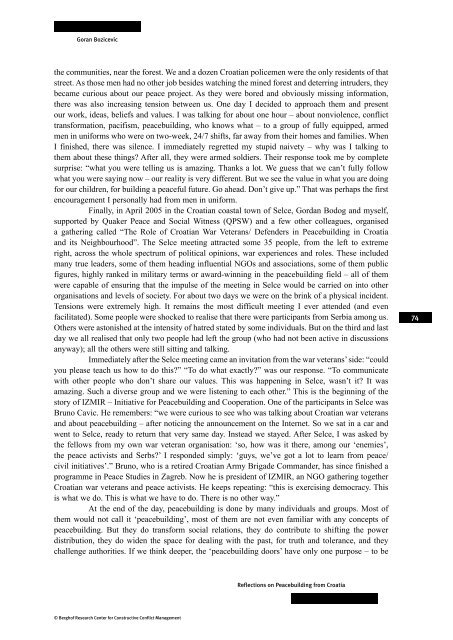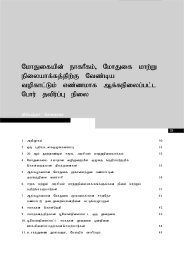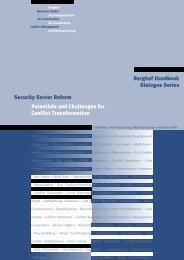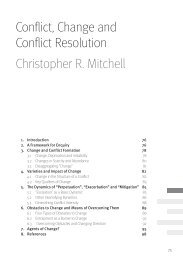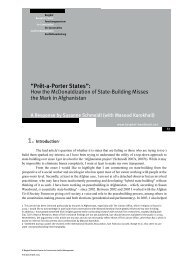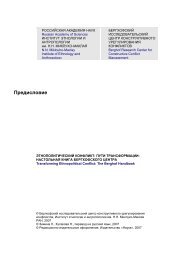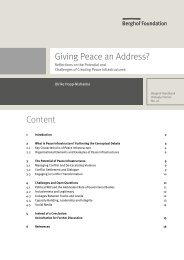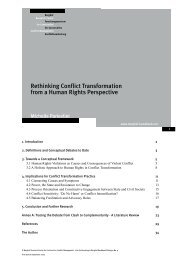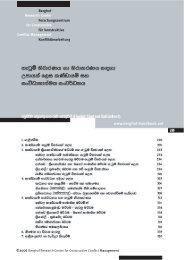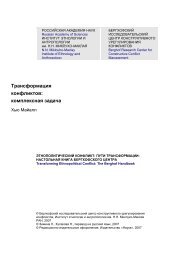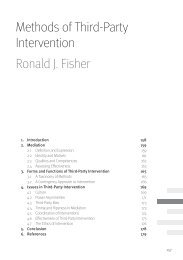Reflections on Peacebuilding from Croatia - Berghof Handbook for ...
Reflections on Peacebuilding from Croatia - Berghof Handbook for ...
Reflections on Peacebuilding from Croatia - Berghof Handbook for ...
Create successful ePaper yourself
Turn your PDF publications into a flip-book with our unique Google optimized e-Paper software.
Goran Bozicevic<br />
the communities, near the <strong>for</strong>est. We and a dozen <strong>Croatia</strong>n policemen were the <strong>on</strong>ly residents of that<br />
street. As those men had no other job besides watching the mined <strong>for</strong>est and deterring intruders, they<br />
became curious about our peace project. As they were bored and obviously missing in<strong>for</strong>mati<strong>on</strong>,<br />
there was also increasing tensi<strong>on</strong> between us. One day I decided to approach them and present<br />
our work, ideas, beliefs and values. I was talking <strong>for</strong> about <strong>on</strong>e hour – about n<strong>on</strong>violence, c<strong>on</strong>flict<br />
trans<strong>for</strong>mati<strong>on</strong>, pacifism, peacebuilding, who knows what – to a group of fully equipped, armed<br />
men in uni<strong>for</strong>ms who were <strong>on</strong> two-week, 24/7 shifts, far away <strong>from</strong> their homes and families. When<br />
I finished, there was silence. I immediately regretted my stupid naivety – why was I talking to<br />
them about these things? After all, they were armed soldiers. Their resp<strong>on</strong>se took me by complete<br />
surprise: “what you were telling us is amazing. Thanks a lot. We guess that we can’t fully follow<br />
what you were saying now – our reality is very different. But we see the value in what you are doing<br />
<strong>for</strong> our children, <strong>for</strong> building a peaceful future. Go ahead. D<strong>on</strong>’t give up.” That was perhaps the first<br />
encouragement I pers<strong>on</strong>ally had <strong>from</strong> men in uni<strong>for</strong>m.<br />
Finally, in April 2005 in the <strong>Croatia</strong>n coastal town of Selce, Gordan Bodog and myself,<br />
supported by Quaker Peace and Social Witness (QPSW) and a few other colleagues, organised<br />
a gathering called “The Role of <strong>Croatia</strong>n War Veterans/ Defenders in <strong>Peacebuilding</strong> in <strong>Croatia</strong><br />
and its Neighbourhood”. The Selce meeting attracted some 35 people, <strong>from</strong> the left to extreme<br />
right, across the whole spectrum of political opini<strong>on</strong>s, war experiences and roles. These included<br />
many true leaders, some of them heading influential NGOs and associati<strong>on</strong>s, some of them public<br />
figures, highly ranked in military terms or award-winning in the peacebuilding field – all of them<br />
were capable of ensuring that the impulse of the meeting in Selce would be carried <strong>on</strong> into other<br />
organisati<strong>on</strong>s and levels of society. For about two days we were <strong>on</strong> the brink of a physical incident.<br />
Tensi<strong>on</strong>s were extremely high. It remains the most difficult meeting I ever attended (and even<br />
facilitated). Some people were shocked to realise that there were participants <strong>from</strong> Serbia am<strong>on</strong>g us.<br />
Others were ast<strong>on</strong>ished at the intensity of hatred stated by some individuals. But <strong>on</strong> the third and last<br />
day we all realised that <strong>on</strong>ly two people had left the group (who had not been active in discussi<strong>on</strong>s<br />
anyway); all the others were still sitting and talking.<br />
Immediately after the Selce meeting came an invitati<strong>on</strong> <strong>from</strong> the war veterans’ side: “could<br />
you please teach us how to do this?” “To do what exactly?” was our resp<strong>on</strong>se. “To communicate<br />
with other people who d<strong>on</strong>’t share our values. This was happening in Selce, wasn’t it? It was<br />
amazing. Such a diverse group and we were listening to each other.” This is the beginning of the<br />
story of IZMIR – Initiative <strong>for</strong> <strong>Peacebuilding</strong> and Cooperati<strong>on</strong>. One of the participants in Selce was<br />
Bruno Cavic. He remembers: “we were curious to see who was talking about <strong>Croatia</strong>n war veterans<br />
and about peacebuilding – after noticing the announcement <strong>on</strong> the Internet. So we sat in a car and<br />
went to Selce, ready to return that very same day. Instead we stayed. After Selce, I was asked by<br />
the fellows <strong>from</strong> my own war veteran organisati<strong>on</strong>: ‘so, how was it there, am<strong>on</strong>g our ‘enemies’,<br />
the peace activists and Serbs?’ I resp<strong>on</strong>ded simply: ‘guys, we’ve got a lot to learn <strong>from</strong> peace/<br />
civil initiatives’.” Bruno, who is a retired <strong>Croatia</strong>n Army Brigade Commander, has since finished a<br />
programme in Peace Studies in Zagreb. Now he is president of IZMIR, an NGO gathering together<br />
<strong>Croatia</strong>n war veterans and peace activists. He keeps repeating: “this is exercising democracy. This<br />
is what we do. This is what we have to do. There is no other way.”<br />
At the end of the day, peacebuilding is d<strong>on</strong>e by many individuals and groups. Most of<br />
them would not call it ‘peacebuilding’, most of them are not even familiar with any c<strong>on</strong>cepts of<br />
peacebuilding. But they do trans<strong>for</strong>m social relati<strong>on</strong>s, they do c<strong>on</strong>tribute to shifting the power<br />
distributi<strong>on</strong>, they do widen the space <strong>for</strong> dealing with the past, <strong>for</strong> truth and tolerance, and they<br />
challenge authorities. If we think deeper, the ‘peacebuilding doors’ have <strong>on</strong>ly <strong>on</strong>e purpose – to be<br />
© <strong>Berghof</strong> Research Center <strong>for</strong> C<strong>on</strong>structive C<strong>on</strong>flict Management<br />
<str<strong>on</strong>g>Reflecti<strong>on</strong>s</str<strong>on</strong>g> <strong>on</strong> <strong>Peacebuilding</strong> <strong>from</strong> <strong>Croatia</strong><br />
74


